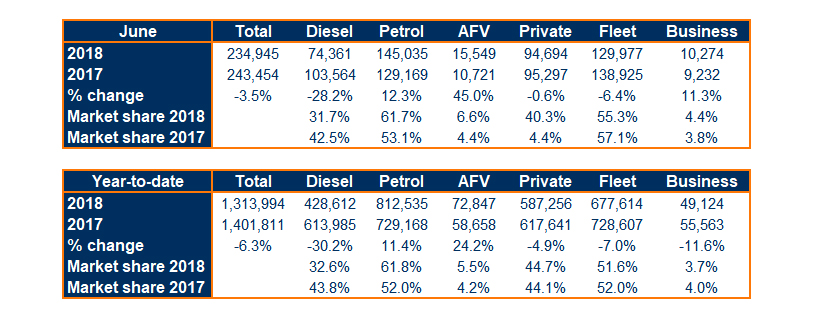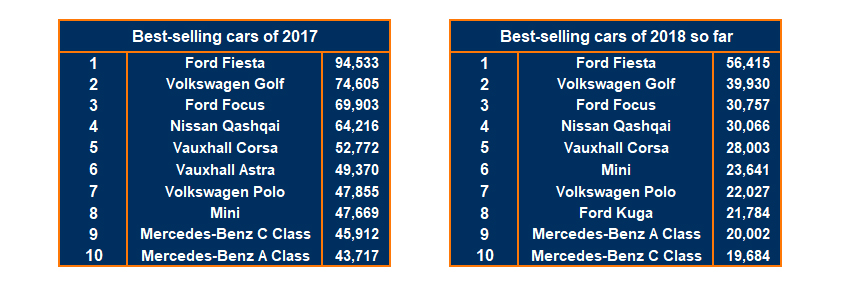New and used car sales continue to decline but the market is slowly starting to stabilise.
2017 was a rocky year for both new and used car sales, the struggles have been blamed on a drop in confidence which the Society of Motor Manufacturers (S.M.M.T.) believes has been partly caused by Brexit and the uncertainty over whether to buy a diesel or to invest in an alternatively fuelled vehicle. Overall, new car sales dipped by -5.4% and used car sales were down by -1.1% compared with 2016. The latest data for 2018 shows that, while sales have continued to decline, they have also started to stabilise.
The new car market declined moderately in June as new car registrations fell year-on-year by -3.5% to 243,454, compared to 243,945 in June of last year. The year-to-date market fell -6.3%, with 1.3 million new cars joining UK roads in the first six months.
8,113,020 used cars were sold in 2017 down from 8,200,084 in 2016, and the trend continues into 2018 with a -4.8% decline in sales during Q1 of 2018. Despite this decline in sales, it is the third highest Q1 level on record, thanks to an increase in demand for electric vehicles.
The business sector was the only market to see an increase in sales in June, with an 11.3% rise compared with June 2017. Demand from larger fleets fell by 6.4%, and private demand remained relatively stable at -0.6%.
Increased demand for alternatively fuelled vehicles
So far in 2018, there has been a 45% increase in plug-in and hybrid registrations as consumers responded to manufactures releasing more plug-in hybrid and electric vehicles. Electric vehicle sales reached 14,084 in the first quarter of 2018, with plug-in hybrid vehicles responsible for 71% of the sales.
The overall market share of electric vehicles has increased from 4.2% in 2017 to 5.5% in 2018. While this is a positive move for greener fuel options, the UK is still behind many other countries when it comes to electric vehicle market share. In the first three months of 2018, Norway saw a 48% increase in electric vehicle sales, while China more than doubled electric vehicle sales by a massive 154%.
Petrol cars are also attracting more buyers, with demand up 12.3%. However, this growth was not enough to compensate for the continuing decline in diesel engine sales, with a -28.2% fall as a result of continuing consumer uncertainty and environmental pressures.
As politicians have become more focused on air quality, potential customers have become more worried about restrictions on diesel cars. The Volkswagen scandal, green air campaigns and the government aiming for 60% of car and van sales to be electric by 2030, are all major factors that have led to a drop in diesel cars sales.
Top of the car charts
The best selling cars have carried on the same trend that was seen in 2017 with smaller cars and superminis remaining the most popular. So far this year, the top 5 best-selling cars remain unchanged with the Ford Fiesta continuing to hold the crown for the best-selling car. The Corsa is the only Vauxhall in the top 10 at the moment, the Astra was at number 6 last year but has failed to sell enough in the first half of 2018 to get into the top 10. The MINI is up from 8th to 6th and the Volkswagen Polo holds at 7th. The Ford Kuga is the only new model on the list, coming in at number 8. Mercedes-Benz continue to hold 9th and 10th position, with their A Class currently outselling their C Class.
- Source: www.smmt.co.uk

